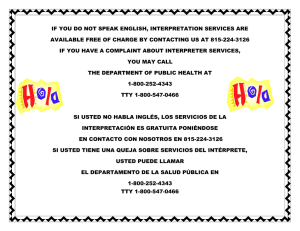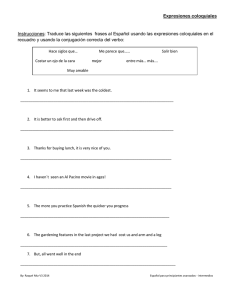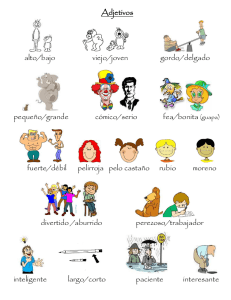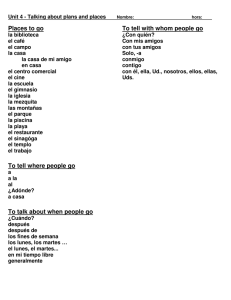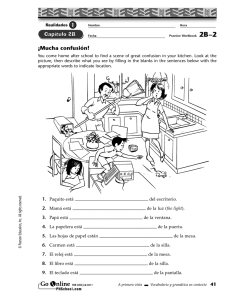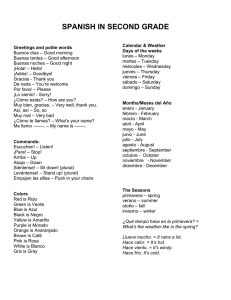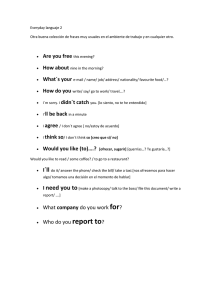3. Oraciones
Anuncio
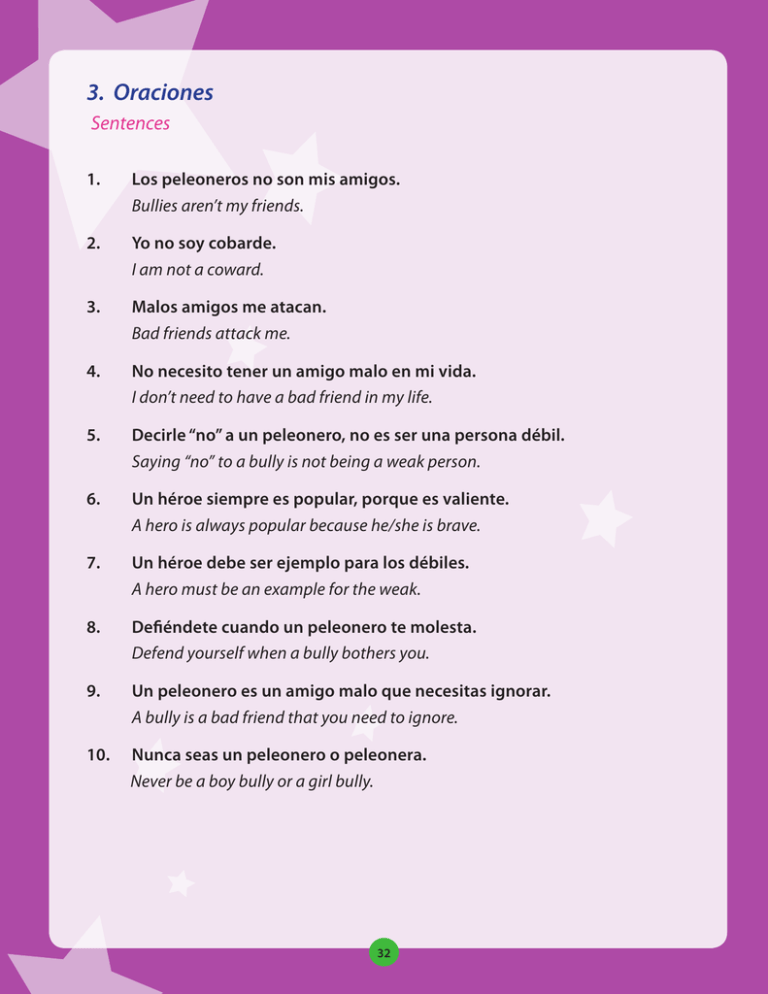
3. Oraciones Sentences 1. Los peleoneros no son mis amigos. Bullies aren’t my friends. 2. Yo no soy cobarde. I am not a coward. 3. Malos amigos me atacan. Bad friends attack me. 4. No necesito tener un amigo malo en mi vida. I don’t need to have a bad friend in my life. 5. Decirle “no” a un peleonero, no es ser una persona débil. Saying “no” to a bully is not being a weak person. 6. Un héroe siempre es popular, porque es valiente. A hero is always popular because he/she is brave. 7. Un héroe debe ser ejemplo para los débiles. A hero must be an example for the weak. 8. Defiéndete cuando un peleonero te molesta. Defend yourself when a bully bothers you. 9. Un peleonero es un amigo malo que necesitas ignorar. A bully is a bad friend that you need to ignore. 10. Nunca seas un peleonero o peleonera. Never be a boy bully or a girl bully. 32 4. Gramática (Grammar) A. El modo imperativo (Imperative mood) When something is imperative, it is of the upmost importance! When are in this mood, then it is something that must be taken seriously! Let’s look at the difference: What are we looking for? Look at the regular sentences. Imperatives become orders. Examples: (tú) Eres bien fuerte.- You are really strong. = (tú) Sé bien fuerte. – Be really strong. Tú te defiendes. - You defend yourself. = (tú) ¡Defiéndete!- Defend yourself! Tú le dices.- You tell him. = (tú) ¡Díle! - Tell him! Do you remember negative expressions? They can also be used to change meaning: (tú) Debes ser un héroe. - You should be a hero. = (tú) No debes ser un cobarde.- You shouldn’t be a coward. Tú lo permites. - You permit it. = (tú) Nunca lo permitas.- Never permit it. 33 5. Ejercicios Exercises 1. ¡Es imperativo! (It’s imperative!) Translate these into English! Example: Sé bien fuerte. Be really strong. No debes ser un peleonero. ______________________ Díle a papá. ______________________ Nunca lo permitas. ______________________ 2. ¡No me ordenes! (Don’t order me!) Here is a situation. Bullies/parents are trying to boss you around. Don’t let them! Fight fire with fire, circle the imperative. Tú apagas la luz. ¡Apaga la luz! (You turn off the light.) (Turn off the light!) ¡Barre! Tú barres. (Sweep!) (You sweep.) Tú me dices. ¡No me digas! (You tell me.) (Don’t tell me!) Tú lo tocas. ¡Tócalo! (You touch it.) (Touch it!) ¡Díle! Tú le dices. (Tell him/her!) (You tell him/her.) 34 Tú le dices. ¡No le digas! (You tell him/her.) (Don’t tell her/him!) Tú corres. ¡Corre! (You run.) (Run!) Tú corres. ¡No corras! (You run.) (Don’t run!) 35 Cuento Story Yo tengo un problema, tengo una hermanita peleonera. Cada vez que salimos a comer con la familia, ella se sirve mucha comida, no comparte y después la tira a la basura. Me pega y después se protege con mi papi cuando le digo a mamá. ¿Qué debo hacer? Sé que un peleonero no es un buen amigo, pero ¿qué debo hacer si tengo un peleonero en mi familia? No puedo ignorar a esta peleonera y ya decidí que debo ayudar a mi hermanita. Ahora, quiero ser un ejemplo para ella. Cada vez que salimos a comer, yo soy el primero a compartir la comida. Le doy grandes porciones y le digo a papá, “Quien acabe primero será el ganador, quien acabe último tirará la basura de los dos.”. Ahora cada vez que me trata de pegar, yo grito “¡Socorro! ¿Dónde está mi hermanita?” Ella se tranquiliza confundida y me dice “yo soy tu hermanita.” Entonces yo le aclaro que no tengo hermanitas peleoneras y que debemos sacar a los peleoneros de nuestra familia. Mi hermanita ya no es peleonera porque yo fui un ejemplo valiente. Algunas veces es difícil defenderse de los peleoneros pero no debo tener temor porque un amigo o familiar bueno ayuda a ser un ejemplo para los demás. 36 No deb em os p 37 ele ar
